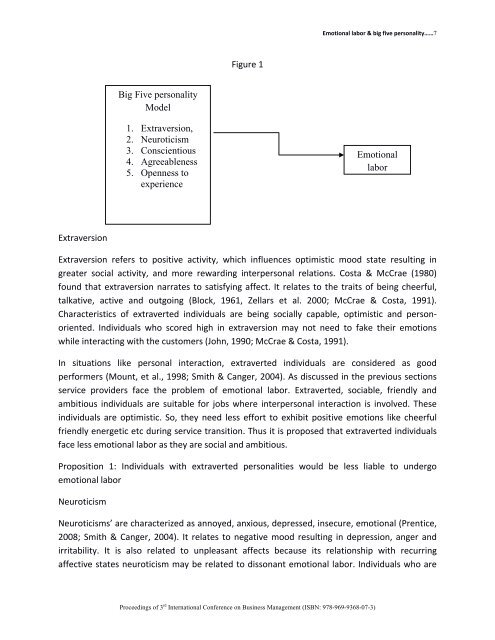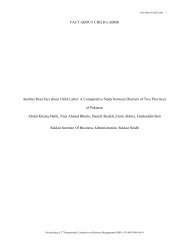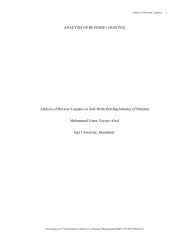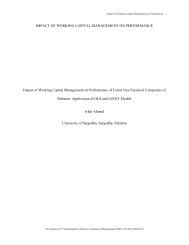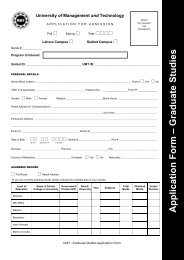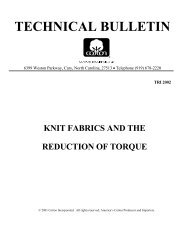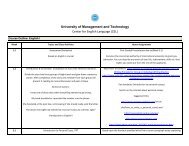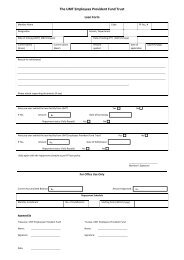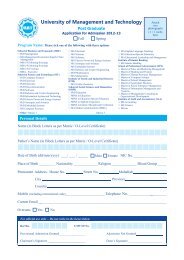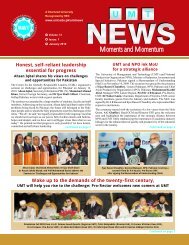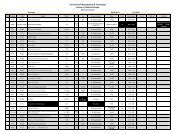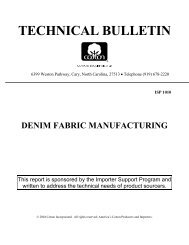<strong>Emotional</strong> labor & big five personality……6(Borgatta, 1964; Hakel, 1974; Lorr & Manning, 1978; Norman, 1963; Conley, 1985; Noller et al.,1987; John, 1989; McCrae & Costa, 1985; Smith, 1967). Traits linked with this dimensioninclude being depressed, nervous, embarrassed, angry, insecure and emotionally, worried. Thethird dimension is Agreeableness (Borgatta, 1964; Norman, 1963; Hakel, 1974; Goldberg, 1981;Hogan, 1983; Conley, 1985; McCrae & Costa, 1985; John, 1989; Smith, 1967; Tupes & Christal,1961). Common traits associated with this dimension being flexible, courteous, friendliness,good-natured, cooperative, trusting, s<strong>of</strong>t-hearted, and tolerant and forgiving (Guilford &Zimmerman, 1949). The fourth dimension is Conscientiousness (Norman, 1963; Hakel, 1974;McCrae & Costa, 1985; Noller et al., 1987; Botwin & Buss, 1989; John, 1989), traits associatedwith this dimension are organized, hardworking, responsible, and persistent and achievementoriented (Peabody & Goldberg, 1989; Prentice, 2008; Smith & Canger, 2004). The lastdimension is Openness to Experience (McCrae & Costa, 1985). Traits generally associated withthis dimension consist <strong>of</strong> being, cultured, imaginative, original, curious, artistically sensitive,broad-minded and intelligent (Barrick & Mount, 1991).While no consensual classification <strong>of</strong> personality currently exists, the big five model reflectssome convergence in establishing a parsimonious classification <strong>of</strong> personality dimensions. Itsdimensions hypothetically represent super ordinate, orthogonal traits believed to cover theassortment <strong>of</strong> normal personality. The generalizability, comprehensiveness and robustness <strong>of</strong>the big five model has generally been acknowledged (Goldberg, 1993; Wiggins & Trapnell,1997).The big five model is also a useful framework for investigating emotional labor, as it has beenutilized to investigate a wide range <strong>of</strong> workplace phenomena, such as vocational interests,organizational citizenship behaviors, job performance (Tokar et al., 1998).CONCEPTUAL FRAMEWORKAs illustrated in the research objective, the intention <strong>of</strong> this paper is to foresee that personalityor individual characteristics play a vital role in understanding and describing the phenomenon<strong>of</strong> emotional labor. Deriving from literature on personality, emotional labor, sociology andorganizational psychology, this paper proposes following conceptual framework. Based onpersonality traits (extraversion, agreeableness, conscientious, neuroticism, and openness) <strong>of</strong>big five model propositions are being made on how it will impact the emotional labor thatworkers will feel during interpersonal transactions.Proceedings <strong>of</strong> 3 rd International Conference on Business Management (ISBN: 978-969-9368-07-3)
<strong>Emotional</strong> labor & big five personality……7Figure 1<strong>Big</strong> <strong>Five</strong> personality<strong>Model</strong>1. Extraversion,2. Neuroticism3. Conscientious4. Agreeableness5. Openness toexperience<strong>Emotional</strong>laborExtraversionExtraversion refers to positive activity, which influences optimistic mood state resulting ingreater social activity, and more rewarding interpersonal relations. Costa & McCrae (1980)found that extraversion narrates to satisfying affect. It relates to the traits <strong>of</strong> being cheerful,talkative, active and outgoing (Block, 1961, Zellars et al. 2000; McCrae & Costa, 1991).Characteristics <strong>of</strong> extraverted individuals are being socially capable, optimistic and personoriented.Individuals who scored high in extraversion may not need to fake their emotionswhile interacting with the customers (John, 1990; McCrae & Costa, 1991).In situations like personal interaction, extraverted individuals are considered as goodperformers (Mount, et al., 1998; Smith & Canger, 2004). As discussed in the previous sectionsservice providers face the problem <strong>of</strong> emotional labor. Extraverted, sociable, friendly andambitious individuals are suitable for jobs where interpersonal interaction is involved. Theseindividuals are optimistic. So, they need less effort to exhibit positive emotions like cheerfulfriendly energetic etc during service transition. Thus it is proposed that extraverted individualsface less emotional labor as they are social and ambitious.Proposition 1: Individuals with extraverted personalities would be less liable to undergoemotional laborNeuroticismNeuroticisms’ are characterized as annoyed, anxious, depressed, insecure, emotional (Prentice,2008; Smith & Canger, 2004). It relates to negative mood resulting in depression, anger andirritability. It is also related to unpleasant affects because its relationship with recurringaffective states neuroticism may be related to dissonant emotional labor. Individuals who areProceedings <strong>of</strong> 3 rd International Conference on Business Management (ISBN: 978-969-9368-07-3)


